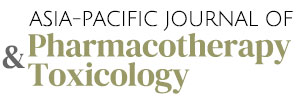Asia-Pacific Journal of Pharmacotherapy & Toxicology (AJPT) is aware of the potential impact allegations of ethical misconduct that can have on a researcher's career. We take all allegations of unethical conduct seriously and investigate them fully.
A. The Co-managing editor should always be the first point of contact and will seek clarification from all affected parties in accordance with COPE guidelines.
B. If the allegation is made against any of the co-editors, it should be sent to the publisher for further investigation.
C. If a third party brings an allegation of plagiarism to AJPT, the Co-editorial Managing Editor will always seek a response from the original author or copyright owner before making a recommendation.
D. The Co-Managing Editor will abide by the COPE flow chart and will not be influenced by other parties. Any decision will be made in a fair and objective manner. At all times, the Co-Managing editors will remain neutral, act in good faith and, where possible, educate.
E. Publishers are under no obligation to discuss cases of alleged plagiarism with third parties.
F. If the complainant provides a false name or affiliation, or acts in an inappropriate or threatening manner towards journal editors and staff, the publisher reserves the right not to pursue the case.
Please refer to the guidelines below and the COPE flowchart for the process followed by journals in the case of suspected plagiarism in submitted or published articles.
AJPT welcomes original submissions that have not been simultaneously considered by any other publication and that contribute to the existing body of knowledge. All authors should be aware of the importance of expressing content in their own language, based on their own research. Plagiarism is bad and unethical.
The following types of ethical misconduct should be avoided:
Verbatim copying
Verbatim reproduction of important passages or streams of text from another's work without attribution, citation, or quotation marks.
Apply indiscriminately
There are many cases of improper paraphrasing of someone else's work, but an important one is the rearrangement of sentences in a paragraph or paragraph of text without proper attribution. Significant inappropriate paraphrasing without proper attribution is considered serious verbatim reproduction.
Reusing parts of a work without attribution
Reuse elements from someone else's work, such as figures, tables, or paragraphs, without attribution, citing, or using quotation marks. It is the author's responsibility to obtain the necessary permission from the copyright owner to reuse elements of someone else's work.
Self-plagiarism
AJPT requires all authors to sign a copyright form that clearly states that the work they are submitting has not been previously published. If elements of the work have already been published in other publications, the author must acknowledge the previous work and point out how the subsequent work is different and how it builds on the research and conclusions contained in the previous work. Word-for-word reproduction of an author's own work and interpretation is not allowed, and we recommend reusing research results only if they support new conclusions. Authors should cite all prior stages of publishing and presenting their ideas in the final work, including conference papers, seminar presentations, and mail newsletters. This will ensure that all communication related to work is fully recorded.
Reprinting original works
Exceptions to publication of original work include conference papers, archival papers republished in anniversary or commemorative journals, papers of particular value, and papers that receive only limited circulation (e.g. through corporate newsletters). These papers are republished at the discretion of the Editor-in-Chief. Original works should be fully and correctly attributed and with the permission of the appropriate copyright owner.

 Submit Manuscript
Submit Manuscript